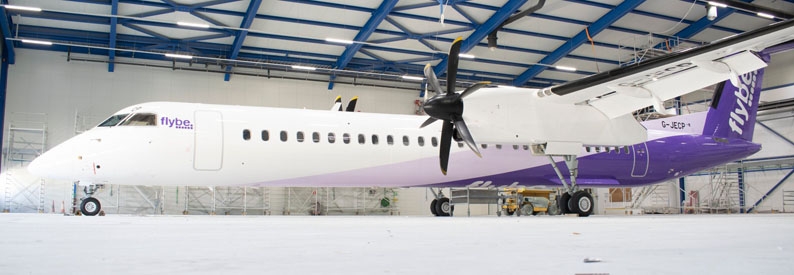Flybe was previously one of Europe's largest previous carriers before its collapse in March 2020 and was the biggest airline in the domestic market in the United Kingdom - with 46.4% of seats in UK domestic regional market (excluding London). The airline had its largest bases in Birmingham and Manchester, with a significant market share in Belfast City, Exeter, Newquay and Southampton, among others. With the Flybe CEO rumoured to be coming to the UK next week and Flybe's website receiving an update in recent weeks, is the relaunch of Flybe imminent and what could we expect from the relaunch?

Since the collapse of Flybe in March 2020, airlines including Aer Lingus, Aurigny, British Airways, Blue Islands, Eastern Airways, easyJet, Loganair and Ryanair have grown the number of UK routes. All bar two domestic routes which were operating at the time of Flybe's collapse have now been picked up - these being Edinburgh-Manchester and Exeter-London City, with both having regular rail links as an alternative to flying (excluding Belfast City-East Midlands and Belfast City-Leeds/Bradford as easyJet have picked up these routes from Belfast International).
The UK domestic market is now more customer friendly. There is increased competition and increased number of carriers, allowing the market to be more resilient to a collapse of an airline and to allow for competitive fares between carriers, which was not seen when Flybe had a large share in the market.
Furthermore, at airports where Flybe had large market share - the majority of routes have been picked up by other carriers. Belfast City have regained most of its routes through Aer Lingus and BA CityFlyer, whilst Southampton has regained all its lost domestic routes through Blue Islands, Eastern Airways and Loganair. With Ryanair returning on domestic flights in December and Emerald Airlines also planning to launch operations in 2022, the UK domestic market is about to become even more saturated - limiting the opportunity for Flybe.
What is the opportunity for Flybe?
It is likely the airline will look to base at Birmingham. Domestically, all of Flybe's former routes have been picked up by Aer Lingus, Aurigny, British Airways, Blue Islands, easyJet or Loganair - with Birmingham having direct flights to 10 domestic airports. If Flybe decides to launch domestic flights, it may find it difficult to compete with airlines which have operated throughout the COVID-19 pandemic or with large brand awareness.
The UK market is dominated by frequent flyers, who tend to stick to one brand. Over the past 18 months, former Flybe customers have moved to other airlines for flights and regaining customer trust and patronage.
Internationally is a different market. Of Flybe's 13 international routes from Birmingham - 9 remain unserved: Bastia, Berlin, Bordeaux, Hamburg, Hanover, Knock, Lyon, Nantes and Stuttgart. This could provide an opportunity for Flybe - connecting regional European cities to Birmingham, which do not face direct competition in order to be able to charge profitable fares.
Additionally, Flybe could look to codeshare with carriers such as Air France or KLM, as they previously have done - to reconnect airports which lost their hub connection to regain their links. These include East Midlands-Amsterdam, Exeter-Amsterdam, Southampton-Paris CDG, which were three of Flybe's most international profitable routes (anna aero). However, for Amsterdam and Paris flights to the UK to succeed, the codeshare would need to be in placed and with European competition rules, this is not guaranteed as codeshare talks cannot commence until the routes are announced.
Another possibility is to concentrate the airline to the Midlands. Operating a base in Birmingham with focus cities in Doncaster/Sheffield and East Midlands, where a number of Flybe routes have been lost and not recovered. This would additionally consolidate costs by focusing on Central England and offer connections across the United Kingdom and Europe. Whilst the Midlands having poor timings and frequencies with existing carriers on domestic and regional routes, it provides an opportunity for the relaunched carrier.
However...
Some of the airports with the greatest market shares have created relationships with alternative carriers. Southampton now has based aircraft with Blue Islands and Eastern Airways, along with weekend based BA CityFlyer aircraft for leisure routes. Belfast City has seen easyJet launch flights to the airport and IAG operate domestic flights from the airport, prior to the launch of Emerald Airlines expected in 2022. Newquay has almost finalised its London PSO and has seen domestic flights return with multiple carriers whilst Exeter has seen BA CityFlyer, Blue Islands and Loganair launch domestic routes from the airport. This demonstrates the resilience of the UK market that multiple carriers have been prepared to pick up routes, however, it limits the opportunity for Flybe.
Flybe's failure came from a lack of focus - wanting to be many things to many people and not being the best at one field. With increased competition in the domestic market and increased low cost carrier presence between secondary UK cities and secondary European cities, it could be difficult for Flybe to regain its brand awareness and customer base which have moved to other carriers. Additionally, many airports will have debt or a poor relationship with the relaunched carrier based on the administration of Flybe, which may harm potential deals with airports to base aircraft or operate flights. With the majority of Flybe's profitable routes being picked up by other carriers, is there a market for them to succeed in or is this another venture doomed for failure?

Comments
Post a Comment